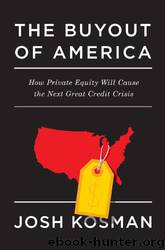The Buyout of America by Josh Kosman

Author:Josh Kosman
Language: eng
Format: epub
Publisher: Penguin USA, Inc.
PART THREE
WHAT NOW?
CHAPTER NINE
The Next Great European Credit Crisis
“How many industries can you think of right now where America is the dominant player in the world?” asked Carlyle Group cofounder David Rubenstein of a friendly audience at the conservative American Enterprise Institute think tank in November 2007.
Rubenstein, tall and wearing a dark blue pinstripe suit, was explaining why he believed the government should encourage private equity. “There are very few industries now where without question we are the dominant player in the world. Maybe entertainment in some ways. Maybe some Silicon Valley software-type companies. One of those where we do dominate the global economy in is private equity.”
And nowhere has the influence of American private-equity firms been more notable than in England. In the 1980s and early 1990s, several English firms were doing LBOs and other private-equity deals, but they were relatively small. Then, in the late 1990s, the Americans invaded with their much larger deals and aggressive tactics, and the rules of the game changed. By 2008, private equity was more pervasive in England than America, and had expanded to the rest of Europe. Now the companies they bought are facing the same huge debt burdens and likely defaults as those looming in the United States.
As Peter Taylor, managing partner at London’s Duke Street Capital, describes the situation in Britain, “I started in private equity in the 1980s at a time when, actually, the term private equity didn’t exist. We weren’t really doing venture capital, but that’s what we called it. And, of course, nobody had any money. We had to club together to do all our deals.” In 1988, his previous firm, Bridgepoint, partnered with three other firms to buy Focus, a do-it-yourself retailer and gardening center, for £10 million. At the same time, U.S. firm Kohlberg Kravis Roberts (KKR) was buying RJR Nabisco for $25 billion. The occasional £100 million deals were getting done in the United Kingdom, but it was nothing like what was happening in America.
During the 1990s, British PE firms started to buy companies on their own. Then in 1998, the British government, led by Chancellor of the Exchequer Gordon Brown (later to become prime minister), cut the capital gains tax from 40 percent to 10 percent. This meant that people buying and selling businesses could keep much more of their money. At the same time, taxes were imposed on those collecting options from public companies. Brown wanted to promote entrepreneurship and in the process opened the floodgates. “Suddenly, the step change happened in the very late 90s,” Taylor said.
These changes in British tax laws occurred just as the rich valuations of the dot-com boom had put many public companies in the United States beyond the reach of PE firms. The U.S. PE firms, that had more than $90 billion in unspent capital, sensed opportunity and quickly allocated 25 percent of that, $22.5 billion, to buying European businesses. Heavyweights Apollo Management; Clayton, Dubilier & Rice; Hicks, Muse, Tate & Furst; KKR; and TPG all opened London offices from 1997 to 1999.
Download
This site does not store any files on its server. We only index and link to content provided by other sites. Please contact the content providers to delete copyright contents if any and email us, we'll remove relevant links or contents immediately.
| Private Equity | Valuation |
| Venture Capital |
The Black Swan by Nassim Nicholas Taleb(7129)
Bad Blood by John Carreyrou(6622)
Pioneering Portfolio Management by David F. Swensen(6301)
Millionaire: The Philanderer, Gambler, and Duelist Who Invented Modern Finance by Janet Gleeson(4478)
Skin in the Game by Nassim Nicholas Taleb(4250)
The Money Culture by Michael Lewis(4207)
Bullshit Jobs by David Graeber(4191)
Skin in the Game: Hidden Asymmetries in Daily Life by Nassim Nicholas Taleb(4007)
The Wisdom of Finance by Mihir Desai(3748)
Blockchain Basics by Daniel Drescher(3583)
Liar's Poker by Michael Lewis(3450)
Fooled by Randomness: The Hidden Role of Chance in Life and in the Markets by Nassim Nicholas Taleb(3124)
Hands-On Machine Learning for Algorithmic Trading by Stefan Jansen(3072)
Mastering Bitcoin: Programming the Open Blockchain by Andreas M. Antonopoulos(3045)
The Intelligent Investor by Benjamin Graham Jason Zweig(3042)
The Power of Broke by Daymond John(2988)
Investing For Dummies by Eric Tyson(2955)
You Are What You Risk by Michele Wucker(2838)
Bull by the Horns: Fighting to Save Main Street From Wall Street and Wall Street From Itself by Sheila Bair(2777)
